At 2:00 p.m., September 9, 2021, the 2020 MSW Summer Professional Internship Report Meeting of the school of Sociology of China University of Political Science and Law was held in classroom 0507 of comprehensive teaching-building in the Xueyuan Road Campus. Ms. Jiang Haiyan, Mr. Xiong Guibin, Ms. Zhang Li, Mr. Li An, Ms. Zheng Mengyi, Ms. Yang Lu, Mr. Li Huairui and Ms. Gao Siyu attended this meeting. The report meeting was presided over by Mr. Fan Xing.
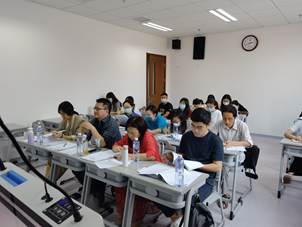
The reporting group was divided according to the internship location. This report included four groups of group exhibitions and two groups of individual exhibitions. The reporting order was determined by drawing lots. The report meeting adopted a combination of online and offline methods.
The reporters in the first group are Chen Qin and Zhang Heqi. First, Chen Qin reported that the internship place is the diversified mediation center of contradictions and disputes in Fangshan District, Beijing. Chen Qin’s internship in the mediation center is mainly divided into four parts for reporting, including institution introduction, job introduction, internship discovery and reflection and personal growth. Chen Qin was mainly responsible for sorting out past cases, preparing training materials, participating in legal publicity and case receiving observation. The mediation center applies information communication technology to mediation practice, which effectively improves the success rate of the center in mediation and greatly reduces the time required for mediation. After that, Chen Qin reflected on her internship and pointed out that the combination of technology and mediation will become the norm and it is needed to classify the cases that require mediation and cultivate mediation skills to deal with different disputes. Next, Zhang Heqi reported on her findings and personal growth in his internship. He believed that there was a fit between the mediation center and judicial social work in terms of operation mode, value orientation, basic principles, social management function and work ability, and that she lacked experience and reserves of legal knowledge. At last, the two students said that the internship in the mediation center was a rare experience, which showed the difficulty of combining social work theory with practice, and helped to abandon prejudice, maintain rationality and realize personal growth.
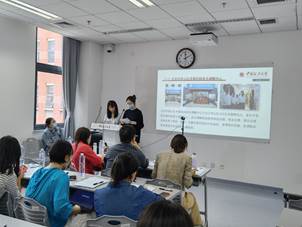
The reporter of the second group is Cui Fangyuan and Dong Leqi. Their internship place was Yangzhou Zhen’ai social work office, which is mainly engaged in the practical and research work of community correctors, criminals, drug-related personnel and other special groups who need psychological and behavioral intervention. The projects that Dong Leqi and Cui Fangyuan participated in in Zhen’ai office mainly include the evidence-based correction project for female community correction objects from the perspective of gender and the project entrusted by Yangzhou Municipal People’s Procuratorate to carry out assistance, education and relief for juvenile and juvenile victims involved in crime. The first is Dong Leqi’s introduction to the general situation of the internship institution and the related work content of the project during the internship.
It mainly includes community activities, case counseling, other related activities and the writing of project materials. Dong Leqi introduced the community activities she participated in, mainly the mental health education activities of community correction objects in Meiling street and the party history education activities of community correction objects in thin Slender West Lake Street. In addition, in-depth case interviews were conducted on the two projects entrusted by the procuratorate, involving minors and female offenders. Then Cui Fangyuan introduced the interviews, visits and project data writing they did during their internship. They have interviewed in Taizhou Jiangyan Judicial Office and Yizheng Social Work Station, and have a new understanding and view on the object of correction. They have written the evidence-based correction project for female community correction objects from the gender perspective, the bidding document for the procurement project of Yizheng new town social work service station, the central finance minor protection project, Yangzhou Anti-drug education and publicity project, etc. Finally, Cui Fangyuan summarized their internship experience, put forward the difficulties encountered in the internship process and how to solve them together. Due to the epidemic situation, the internship work of the two students was forced to be terminated and observed at home in Yangzhou, but they have been paying close attention to the relevant work of the internship institution and expressed the hope to continue to consolidate their theoretical knowledge in their future work and better applied in practice.
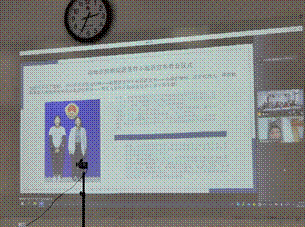
The reporters in the third group were Zhang Yuanyuan and Niu Huizhen. Zhang Yuanyuan first gave a brief introduction to their internship institution, Beijing Social Health Social Work Service Center, and explained the three major sectors of their work - group and community work, daily work and household investigation. From the explanation of these three parts, they drew their own observation and thinking, including the serious self-stigmatization of methadone clinic, its relatively negative coping style and the negative impact of the peer group of the main service object on the behavior of drug abuse, and then highlighted their tone for the future work direction of this group: acceptance and tolerance, to enhance their satisfaction with their own lives. Then Niu Huizhen shared her understanding and feelings from another direction, mainly focusing on the disadvantages of the operation mechanism of methadone clinic and the ethical dilemma of social work, used rich cases to support her conclusions, and expressed her deep thinking about the conflict between knowledge and practical application in this practice.

The reporter of the fourth group is Guo Mengyun and Yang Weili. Their internship place is the basic-level and mediation Department of Fangshan District Judicial Bureau. First, Guo Mengyun reported on her internship. She introduced her internship in four aspects: introduction of internship institution, internship content, work reflection and personal growth. The basic-level and mediation section of Fangshan District Bureau of Justice is mainly responsible for mediation and resettlement assistance and education. Its main work content is to study and guide the work of documents, data sorting, writing data analysis reports and interviews. During her internship, Guo Mengyun reflected on three parts. One is that the legal construction of superstructure lags behind the actual needs and the rights and responsibilities of the management system were unclear. The other is that the staff have insufficient understanding of the classification of key and general work objects. The third is that there is also a wrong understanding of the resettlement, assistance and education work and objects. During the internship, Yang Weili was mainly responsible for sorting and inputting the content data of resettlement assistance and education, writing the analysis report, further learning the guidance documents on resettlement assistance and education, and understanding the whole process of relevant work, which was of great help to improve the quality of his practical work. In addition, during the internship, Yang Weili found that both subjects of resettlement, assistance and education were in different difficulties: as the correction object of socially vulnerable groups, they often suffered discrimination and were in a difficult situation in reality; as correctional workers, the judicial bureau is often unable to cope with habitual crimes and antagonistic correction objects. Therefore, Yang Weili believed that due to the combination of fields, judicial and social work can be introduced into the practical resettlement, assistance and education work, so as to reduce the crime rate and solve the problem of social integration of the correction object. Finally, the two students were able to think seriously and reflect actively, greatly improved their professional theoretical and practical ability, and achieved the purpose of this internship.
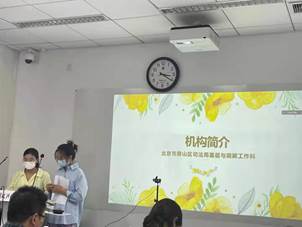
The reporter of the fifth group is Li Jinhua. The internship place is Changgou sub center for multiple mediation of contradictions and disputes in Fangshan District. In the internship report, Li Jinhua divided the internship content into four parts: work content, typical case analysis, internship reflection and summary, and internship suggestions for younger and younger students. Li Jinhua worked as an intern mediator in Changgou sub center. His main work is the auxiliary work of writing mediation records and mediation agreements, as well as the mediation work of actually handling conflicts. There were 11 mediation cases, of which 7 are family division dispute mediation and 4 are neighborhood dispute mediation. Li Jinhua made a specific analysis on the specific process of property analysis cases and the cause analysis, mediation strategy, reflection and summary of neighborhood disputes. He proposed that human involvement could not be avoided in China’s rural dispute mediation. At the same time, he also pointed out the unique effectiveness of local wisdom in solving disputes. After that, we shared the thoughts on whether social work can participate in people’s mediation, and proposed that social work can provide more complete services in the closed loop of the procedure. Finally, Li Jinhua provided valuable experience to the younger students who came to attend the internship report, and stressed the importance of purposeful planning of internship and active communication with colleagues and tutors. After the report, the teachers of the college provided valuable opinions and expressed their recognition of the internship content, research direction and theoretical application of Li Jinhua, but also believed that the research depth needs to be strengthened.
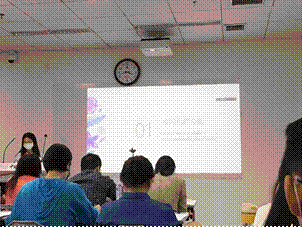
The reporter of the sixth group is Dong Qianqian. The internship place is Sunshine Community Correction Service Center, Dongcheng District, Beijing. Dong Qianqian’s main internship content is to participate in the social investigation of minors involved in crime in the public security stage and the procuratorate stage, the participation of appropriate adults in the case handling center and detention center, and the help and education of minors involved in crime. At the same time, she also participated in the community correction of light crime adults, the design of relevant service programs and the supervision of social work. Dong Qianqian first introduced the relevant procedures of social investigation on minors, the knowledge used and the difficulties in practical operation through three real cases. Next, through a case of community correction, Dong Qianqian vividly showed us how social workers give full play to the unique advantages of social work to promote community correction in the process of community correction. Then Dong Qianqian introduced how the supervision of the internship organization helped social workers improve their practical ability through case analysis and situation simulation. Finally, Dong Qianqian summarized the internship, described her gains in professional identity, personal growth and practical skills, and also reflected on her internship, hoping to strengthen the application of theory and the study of professional knowledge in the future study and improve her theoretical and practical level.
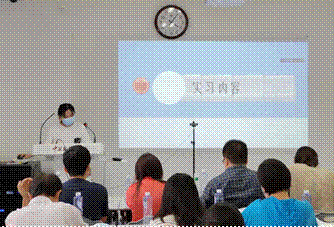
During the reporting process, the teachers made comments and suggestions on the theory and practice of each students’ reporting content, and provided observation and learning opportunities for all 2021 MSW students present about their future internship. The internship report conference fully demonstrated the students’ fruitful internship results, but also exposed some problems, which provided a useful reference for the 2021 MSW junior brothers and sisters; internship next summer. Institutional practice is a very key link in the practical teaching of social work specialty. Students apply the theoretical knowledge learned in class to social practice and organically combine judicial social work theory and practice, which can not only improve students’ comprehensive ability, but also lay a solid foundation for the later graduation thesis writing.